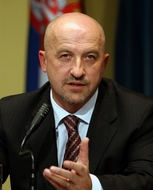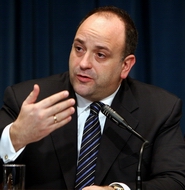Q:
A:
Economic development strategy as basis for implementation of the second phase of transition
Belgrade,
9 November 2006
Serbian Minister of Economy Predrag Bubalo said that the purpose of adoption of the National strategy of economic development is realisation of the second phase of the transition process.
Speaking at a press conference held after the government session, Bubalo explained that the second phase includes continuation of structural reforms, higher economic growth and a more comprehensive resolution of unemployment as one of Serbia's major problems.
He said that in the National strategy of economic development from 2006 to 2012, it is stated that at the end of the first phase of transition, Serbia has achieved macro economic stability and has gone far in the privatisation process, thus setting good foundations for the beginning of the second phase.
Also, during the first phase, systemic reforms have been implemented successfully. A large number of systemic and reform laws were adopted, which contributed to significant results in the economy, such as the rise of GDP, strengthening of the dinar, increase in savings and of foreign currency reserves, Bubalo said.
He said that all these reforms were simultaneously followed by the reforms of the foreign trade and customs system, judiciary, education, health system and public administration.
In spite of the recommendations of the World Bank and the International Monetary Fund to restrain GDP growth to 5% per year, upon the preparation of this document the government still opted for a much quicker pace of economic development in the upcoming period, which entails an annual 7% GDP growth.
The Minister explained that the reasons for that are very rational, that for both GDP growth rates it is necessary to put in the same level of effort, but that quicker economic growth is of greater benefit to society.
He said that the quicker pace of economic development will contribute to a gradual reduction of the development gap between Serbia and the EU, enable the rise in living standards, reduction of unemployment, better use of human, material and geostrategic advantages and contribute to a more efficient implementation of market reforms and quicker integration into European integration processes.
As part of the Strategy, an extensive analysis has been made of all advantages and disadvantages that has to be taken into account during the application of this document. The main advantages are a highly educated workforce, natural and economic potentials and the country's geographical position, Bubalo said.
The Minister added that basic inadequacies mentioned are, outdated technology, worn out infrastructure, a large share of primary and low-tech produce in export, departure of quality work force overseas, as well as large regional differences.
He said that Serbia must use all opportunities for fast future development, and above all for the influx of foreign direct investments (FDI) through entering international transport and energy corridors and free trade with countries of south east Europe, and must remove all threats to faster economic development.
Bubalo stated that realising the basic aim, according to the development scenario, implies that the 20.5% share of investment in GDP from this year is raised to 25.8% in 2012, with an average annual growth of 15.8%. He further elaborated that the 28.5% share of goods export and services in 2005 should be up by 40% in 2010 and by 45% in 2012, with an average growth rate in exports of 17%.
He said that the external trade deficit of 21.9% in GDP in 2005 should be reduced to 16.7% in 2012, with obligatory reduction of public expenditure from 44.1% of GDP to 37.5%.
The basic difference between the accepted scenario which has been presented in the National Strategy and what was suggested by the World Bank and the IMF is that, according to the recommendation of international financial institutions, in 2012 Serbia would have a GDP worth $40.7 billion or $5,600 per head of population, while according to the Strategy it is expected that the GDP would stand at $46.2 billion or $6,500 per head of population, which could take us to the level of development of the 10 newest countries to enter the EU faster, said Bubalo.
According to Bubalo, the biggest leap in the more progressive variation could be expected in productivity, by 40%, and also in employment, which should increase by 5.9%.
In order to realise all this, a minimum of $2 billion annually in FDI is necessary, the process of restructuring and privatisation should be completed, small and medium-sized enterprises must be developed, and macroeconomic stability should be achieved by reducing inflation to less than 5%, explained the Minister.
Bubalo said that a compromise has been achieved on holding parliamentary elections on January 21, 2007, while all other elections will be held after conditions are created and adoption of necessary amendments to the law, as is envisaged in the constitutional bill.
He said that in the National strategy of economic development from 2006 to 2012, it is stated that at the end of the first phase of transition, Serbia has achieved macro economic stability and has gone far in the privatisation process, thus setting good foundations for the beginning of the second phase.
Also, during the first phase, systemic reforms have been implemented successfully. A large number of systemic and reform laws were adopted, which contributed to significant results in the economy, such as the rise of GDP, strengthening of the dinar, increase in savings and of foreign currency reserves, Bubalo said.
He said that all these reforms were simultaneously followed by the reforms of the foreign trade and customs system, judiciary, education, health system and public administration.
In spite of the recommendations of the World Bank and the International Monetary Fund to restrain GDP growth to 5% per year, upon the preparation of this document the government still opted for a much quicker pace of economic development in the upcoming period, which entails an annual 7% GDP growth.
The Minister explained that the reasons for that are very rational, that for both GDP growth rates it is necessary to put in the same level of effort, but that quicker economic growth is of greater benefit to society.
He said that the quicker pace of economic development will contribute to a gradual reduction of the development gap between Serbia and the EU, enable the rise in living standards, reduction of unemployment, better use of human, material and geostrategic advantages and contribute to a more efficient implementation of market reforms and quicker integration into European integration processes.
As part of the Strategy, an extensive analysis has been made of all advantages and disadvantages that has to be taken into account during the application of this document. The main advantages are a highly educated workforce, natural and economic potentials and the country's geographical position, Bubalo said.
The Minister added that basic inadequacies mentioned are, outdated technology, worn out infrastructure, a large share of primary and low-tech produce in export, departure of quality work force overseas, as well as large regional differences.
He said that Serbia must use all opportunities for fast future development, and above all for the influx of foreign direct investments (FDI) through entering international transport and energy corridors and free trade with countries of south east Europe, and must remove all threats to faster economic development.
Bubalo stated that realising the basic aim, according to the development scenario, implies that the 20.5% share of investment in GDP from this year is raised to 25.8% in 2012, with an average annual growth of 15.8%. He further elaborated that the 28.5% share of goods export and services in 2005 should be up by 40% in 2010 and by 45% in 2012, with an average growth rate in exports of 17%.
He said that the external trade deficit of 21.9% in GDP in 2005 should be reduced to 16.7% in 2012, with obligatory reduction of public expenditure from 44.1% of GDP to 37.5%.
The basic difference between the accepted scenario which has been presented in the National Strategy and what was suggested by the World Bank and the IMF is that, according to the recommendation of international financial institutions, in 2012 Serbia would have a GDP worth $40.7 billion or $5,600 per head of population, while according to the Strategy it is expected that the GDP would stand at $46.2 billion or $6,500 per head of population, which could take us to the level of development of the 10 newest countries to enter the EU faster, said Bubalo.
According to Bubalo, the biggest leap in the more progressive variation could be expected in productivity, by 40%, and also in employment, which should increase by 5.9%.
In order to realise all this, a minimum of $2 billion annually in FDI is necessary, the process of restructuring and privatisation should be completed, small and medium-sized enterprises must be developed, and macroeconomic stability should be achieved by reducing inflation to less than 5%, explained the Minister.
Bubalo said that a compromise has been achieved on holding parliamentary elections on January 21, 2007, while all other elections will be held after conditions are created and adoption of necessary amendments to the law, as is envisaged in the constitutional bill.
Serbian Minister of International Economic Relations Milan Parivodic said that the government at its session today adopted the platform for realistion of the Hellenic Plan. He voiced hope that by the end of this month a definite decision will be made by the Greek government on approving €100 million to Serbia for developing the highway from Leskovac to the Macedonian border.
Parivodic said that the government decided not to initial the Central European Free Trade Agreement (CEFTA) because it has been assessed that it is not in Serbia’s interest to do so now, considering the fact that it is necessary to protect legitimate interests of domestic tobacco industry, which is a big part of Serbian industry.
He added that the government wishes that this agreement be initialed and signed as soon as the Croatian government agrees to the very fair and balanced conditions that Serbia has offered, which regard protection of tobacco products.
Parivodic said that the government decided not to initial the Central European Free Trade Agreement (CEFTA) because it has been assessed that it is not in Serbia’s interest to do so now, considering the fact that it is necessary to protect legitimate interests of domestic tobacco industry, which is a big part of Serbian industry.
He added that the government wishes that this agreement be initialed and signed as soon as the Croatian government agrees to the very fair and balanced conditions that Serbia has offered, which regard protection of tobacco products.












